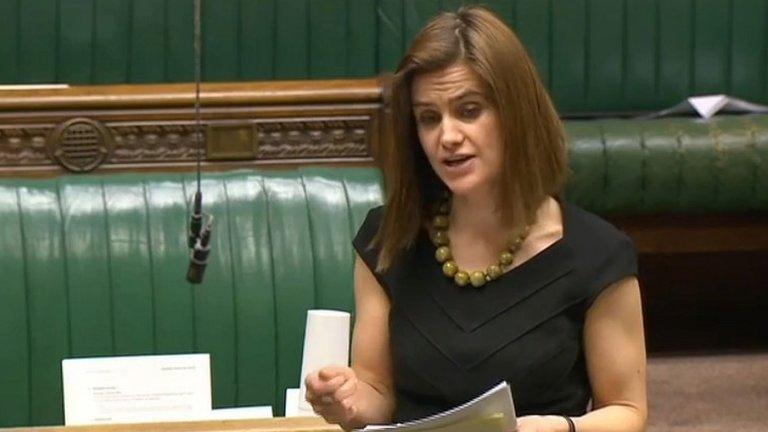Week ahead
- Published
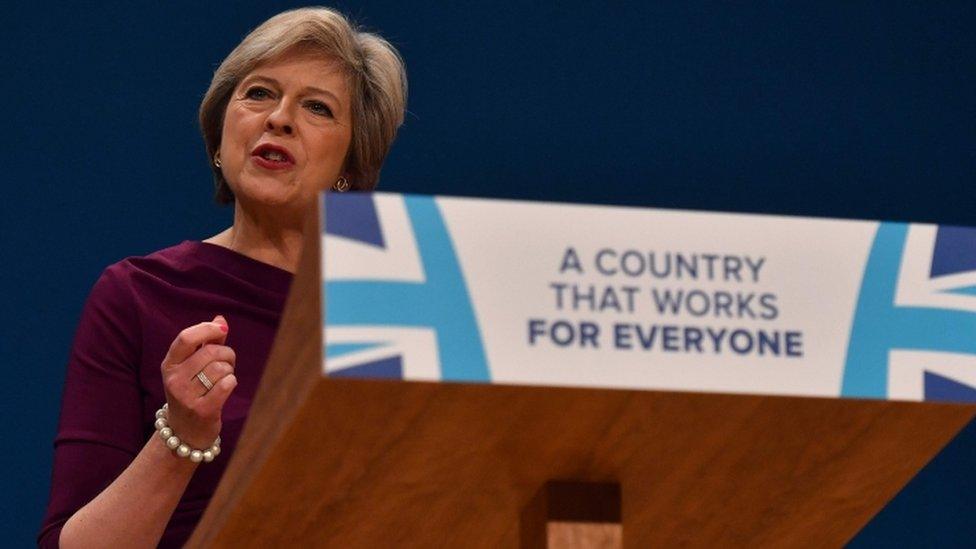
The prime minister's conference speech laid out some of the agenda for her premiership, which will be played out in Parliament in the coming weeks
Suddenly the legislative agenda before Parliament looks pretty small beer, set against the huge ramifications of Brexit - and the biggest parliamentary events of the coming week will probably be statements or urgent questions on some of the host of policy announcements made at the Conservative conference.
But there's also quite a lot of eagerly-awaited in-house business too: the timetable for elections to the new Brexit and International Trade Committees, and to replace Keith Vaz in the Chair of the Home Affairs Committee.
And when will MPs vote on whether or not to move out of the Victorian Palace of Westminster to allow refurbishment work? And what will the government do about the powers and size of the House of Lords? Some announcement on those issues is apparently brewing behind the scenes.
Here's my rundown of the week's action:
Monday
The Commons returns (2.30pm) with Education questions - and after question time, expect the usual post-recess clutch of ministerial statements on issues that have come up since Parliament last sat, three weeks ago. Fracking, anyone?
The main legislative action is the debut of the Neighbourhood Planning Bill, external, which is intended to accelerate the delivery of new homes, and speed up the neighbourhood planning system which will create a locally-decided framework for what development is permitted where - all important components of Theresa May's agenda.
It will also aim to simplify the compulsory purchase order process, which can be essential in delivering big and complex schemes. (The bill was originally supposed to cover infrastructure planning, as well, but that section has been dropped, at least for the time being.)
One key issue will be the section of the bill designed to ensure that planning conditions which require developers to take action before work starts are only used where strictly necessary - on the argument that they lead to too many delays in new developments.
The bill will require that planning permission can't be granted "subject to a pre-commencement conditions, without the written agreement of the applicant to the terms of the condition". And the communities secretary will be given the power to make regulations about what kind of conditions "may or may not be imposed on a grant of planning permissions, and in what circumstances".
The adjournment debate, led by the Conservative Stephen Hammond, continues his campaign for the government to give parents of summer born and premature children the right to defer their start to school. He used a similar debate last year to press ministers for changes, external.
In the Lords (2.30pm) Green Party Peer Baroness Jones of Moulsecoomb has a question on strengthening provisions in the Investigatory Powers Bill to protect data relating to trade union and political activities - an appetiser for the report stage debates on the IP Bill, which start on Tuesday.
Then peers have their first debate on the Wales Bill, external - this tweaks the constitutional settlement for the Welsh Government, moving from a "conferred powers" model to a "reserved powers" model - and devolving responsibility for ports policy, speed limits, bus registration, taxi regulation, local government elections, and sewerage; and grant powers over planning permission for smaller electricity generating stations.
Key issues may be the calls to devolve youth justice, control of air passenger duty, and to create of a separate legal jurisdiction for Wales; and expect attempts to test UK government assurances that the Wales & the Borders rail franchise would be devolved through secondary legislation.
The Conservatives' former leader on the Welsh National Assembly, Lord Bourne of Aberystwyth, the artist formerly known as Nick Bourne, leads for the government - and he will be responding to speeches from at least four former Welsh secretaries, because the speakers' list already includes Lord Crickhowell, Lord Hain, Lord Murphy of Torfaen and Lord Hunt of Wirral, and there are even rumours that a fifth, Lord (William) Hague might pop up as well. Someone ought to coin a collective noun.
That is followed by a debate on the report from the Lords Select Committee on Sexual Violence in Conflict, external.
This calls for a new tribunal to deal with allegations of sexual violence or exploitation by peacekeeping forces, the involvement of women in all peace negotiations - including in Syria - and provide funding to support their participation. And the report urges the government to ratify and implement the Council of Europe's Istanbul Convention on Preventing and Combating Violence Against Women and Domestic Violence at the earliest opportunity.
Tuesday
The Commons opens (11.30am) with Health questions - followed, probably, by more ministerial statements.
Then comes an interesting Ten Minute Rule Bill from Labour MP Conor McGinn. His bill seeks to introduce "Helen's Law" which would see killers kept behind bars until they reveal the whereabouts of their victims' bodies.
At the moment, English law does not require a convicted murderer (at the end of their determined sentence) to admit guilt or reveal the location of a victim's remains before being released.
Mr McGinn's constituent Marie McCourt has been campaigning for Helen's Law following the murder of her daughter Helen in 1988 - her killer has refused to reveal the whereabouts of Helen's body - denying her family the chance to grant her the dignity of a funeral and resting place.
In effect his bill would impose a whole-life tariff for murderers who refuse to disclose the location of their victims and enable their remains to be recovered to give families a chance to pay their last respects. It would not affect convicted killers' ability to maintain their innocence, as they would still be able to use the full appeals process.
The day's main legislating is the second reading of the Small Charitable Donations and Childcare Payments Bill, external which makes changes to the Gift Aid Small Donations Scheme, including removing requirements that prevent newly formed charities from making claims.
The adjournment, led by Labour's Holly Lynch - a member of the all-party parliamentary group on policing, is on police officer safety - she is concerned about an increase in assaults on police officers and unsafe staffing levels - and she recently shadowed officers on an evening shift, where she saw the dangers they face when responding to incidents on their own.
In Westminster Hall, the debates cover forced organ removal in China, the future of Coventry Football Club, the reintroduction of the Royal Yacht Britannia to boost international trade, and HS2 in the North West of England. But the one to watch may be the former immigration minister, Mark Harper, who went on to be chief whip, and has now returned to the backbenches, talking about immigration policy and the disability employment gap after the EU referendum.
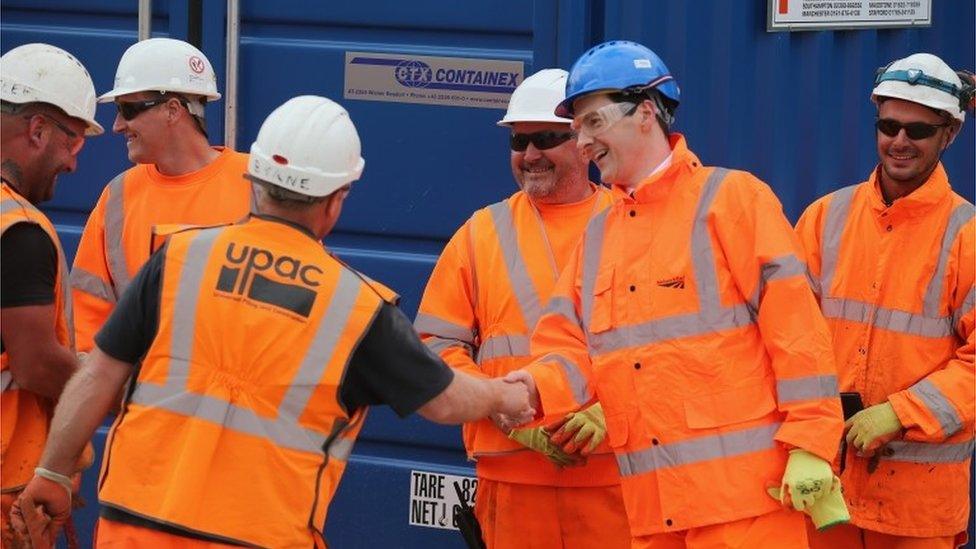
Former Chancellor George Osborne promoted the idea of a Northern Powerhouse - he's answering questions at the Business Committee this week
He recently suggested employers should be challenged about taking on people with disabilities, rather than hiring people from abroad.
On the committee corridor, there are three good hearings in an otherwise humdrum week: first up is the Business Committee hearing on industrial strategy, with three heavyweight witnesses: former BIS Secretaries Vince Cable and Michael Heseltine plus the former Chancellor, George Osborne.
Then, watch out for the Public Administration and Constitutional Affairs hearing (9.45am) on the role and effectiveness of ACoBA and the Independent Adviser on Ministers' Interests - this is the body charged with preventing the "revolving door" between government office and commercial employment by people former minister had previously dealt with...the witnesses include Alexandra Runswick of Unlock Democracy and Ian Hislop, the editor of Private Eye (at 10.45am).
Finally, the Home Secretary, Amber Rudd, and Tim Farron, Leader of the Liberal Democrats, are before the Home Affairs Committee (2.15pm) to talk about anti-Semitism.
In the Lords (2.30pm) two more beneficiaries of David Cameron's resignation honours list take their seats as peers: Baroness Sugg, Liz Sugg, former Head of Operations at Downing Street, and Baroness Cavendish of Little Venice, the journalist Camilla Cavendish, best known for her campaign to open up family courts to media reporting.
After questions, peers get to the crucial stage in their detailed consideration of the Investigatory Powers Bill , external- with the first of three days of report stage debate.
Labour's Baroness Hayter and Lord Rosser have an amendment down to remove the home secretary's power to make regulations under the bill, and there is a battery of amendments down from several Lib Dem peers. They look set to press an amendment from Lady Hamwee and Lord Lester, which toughens up the wording of the restrictions on use of interception techniques.
But my sense is that any danger of a government defeat is rather draining out of this bill - the compromise agreed in the Commons between government ministers and Labour's (then) shadow minister Kier Starmer suggests Labour peers will probably not seek to fricassee this measure in the manner of other recent bills, and without Labour weighing in, the government will not be in danger, however hard the Lib Dems try.
There will also be a short debate on the quality and affordability of housing in the UK, led by Labour's Baroness (Joan) Bakewell of Hardington Mandeville
Wednesday
The Commons meets at 11.30am for Scotland questions, followed at noon by Prime Minister's Question Time. After a masterful debut in July, Theresa May followed up with two below par performances, as Jeremy Corbyn upped his dispatch box game,
The day's Ten Minute Rule Bill from Conservative Barrister Alex Chalk is on Stalking (Sentencing) - Mr Chalk has argued for a series of detailed improvements to various aspects of the criminal law, and this time he wants to increase the maximum sentences available to the court for stalking offences.
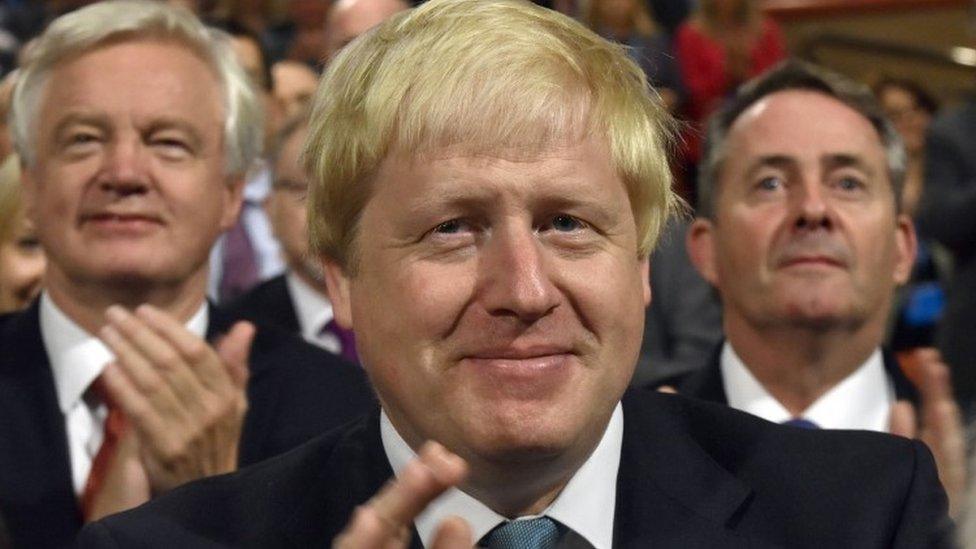
Boris Johnson will make his first committee appearance as foreign secretary
The day's main debate will be on a Labour motion to be announced.
In Westminster Hall, the debates will cover relations between Britain and Iran (led by the Conservative, Seema Kennedy, a member of the increasingly active all-party group on Iran), the future of the European Medicines Agency, government plans to restrict tax credits to two children and the potential effect of the UK leaving the EU on UK tourism.
In the Lords (3pm), the main event is the start of report stage consideration of the Bus Services Bill , external- where Labour plan to press a series of amendments to ensure that the extra powers to run bus services by adopting a franchise model of delivery are available to all local authorities, if they feel it's in the best interests of local communities, and are not restricted to those with elected mayors.
They argue that many rural areas will probably not acquire elected mayors for years, but have an urgent need for better bus services, and should not be made to wait. They also want to remove a clause (21), which would prevent local authorities setting up their own company to run services, arguing that existing municipal bus companies are some of the best in the country, and the option of setting up more should remain open; and they want to protect bus routes as assets of community value in the same way as pubs can be, so a local community can stop a route being axed if it brings real benefits.
Frontbencher Lord (Roy) Kennedy of Southwark, is clearly relishing the chance to "speak up for the countryside".
And that is followed by a debate on the BBC's new charter - among the speakers will be the former Chair of the BBC, Lord Patten of Barnes.
Thursday
The Commons opens (9.30am) with Environment, Food and Rural Affairs questions, and then mini-question times for the MPs who speak for the Church Commissioners, the House of Commons Commission, the Public Accounts Commission and the Speaker's Committee on the Electoral Commission.
With the promise of the Great Repeal Bill to repeal the 1972 European Communities Act to pave the way for Brexit, (Theresa May told her party conference it would come in the next Parliamentary session, starting next May, but might a draft version be put out for pre-legislative scrutiny?) plus the suggestion of a free vote on airport expansion in the south-east of England (ie Heathrow vs Gatwick) there will be more than the usual level of interest in the Business Statement from the new Leader of the Commons, David Lidington. MPs will want to know when these goodies are coming.
The main debates are on two subjects chosen by the Backbench Business Committee - the first is Baby loss which will be led by MPs Antoinette Sandbach and Will Quince, who have both spoken in debates about their experience of infant death and stillbirth. (You can read Mr Quince's debate on bereavement care in maternity units here, external; Ms Sandbach's contribution to the debate is here, external.)
The second debate is on the inquiry into hormone pregnancy tests, external - an Expert Working Panel Group Inquiry was set up by the government to assess the evidence on children born with serious deformities due to hormone pregnancy test drugs taken by expectant mothers between 1953 and 1975; and the motion before MPs "notes with concern" that its terms of reference do not clearly allow for an investigation into the systematic regulatory failures of government bodies at the time and warns that some panel members have a conflict of interest. It says that unless changes are made, the ability of the inquiry to achieve a fair outcome will be "significantly compromised".
Meanwhile in Westminster Hall (1.30pm) there's a debate on the tobacco control plan - Alex Cunningham, Norman Lamb and Flick Drummond lead.
The Committee Corridor highlight is Boris Johnson's debut as foreign secretary before the Foreign Affairs Committee (9.15am). There should be plenty to talk about.
In the Lords (11am) another new peer arrives - Lord Kirkhope of Harrogate - the former leader of the Conservative MEPs, Timothy Kirkhope.
Then, after question time, there will be two backbench debates. First, peers debate government proposals for the extension of grammar schools and selection in education. Actual legislative follow-up for Theresa May's new pro-grammar policy is probably some way off, but listen out for the markers thudding down.
The second debate is on the cultural, civic and educational significance of local libraries and independent bookshops in the UK from Lord Bird.
Friday
Neither House is sitting.
- Published17 June 2016
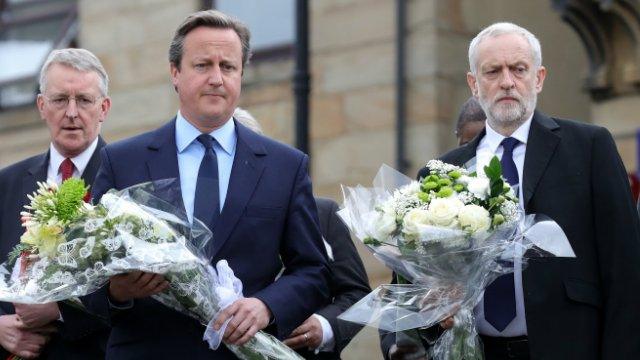
- Published17 June 2016
